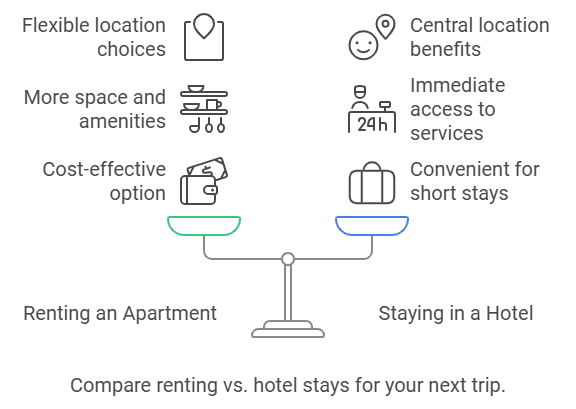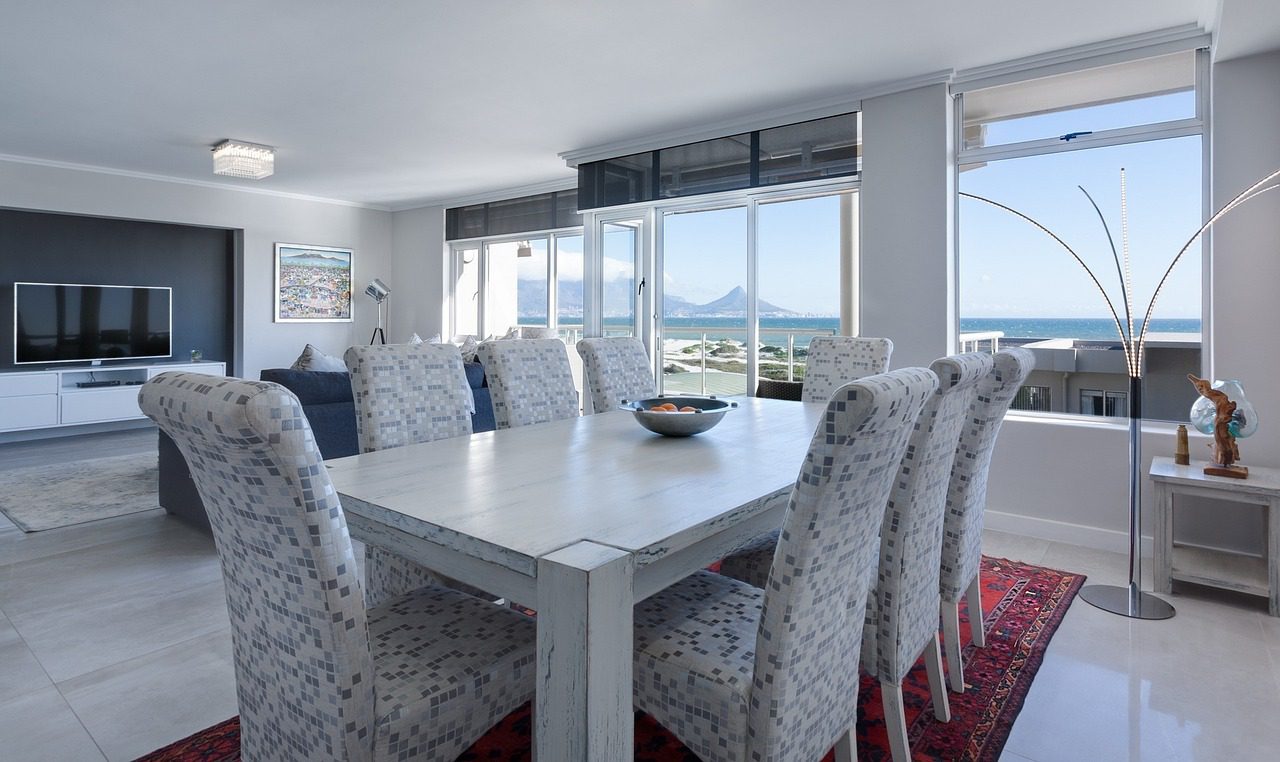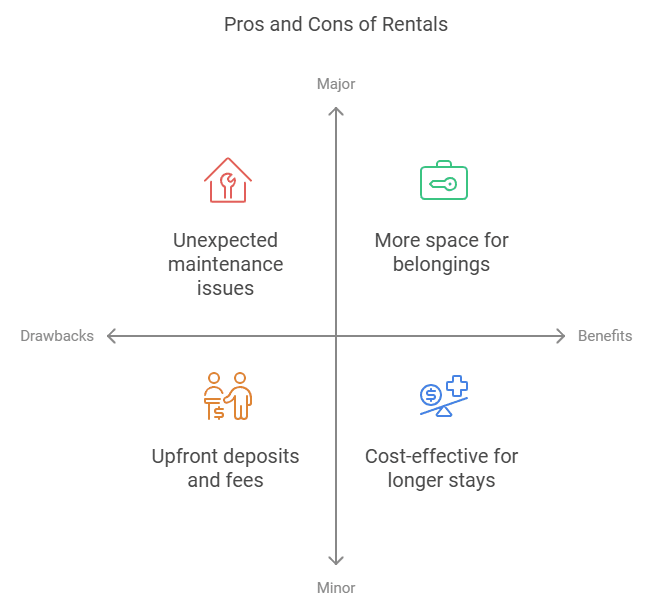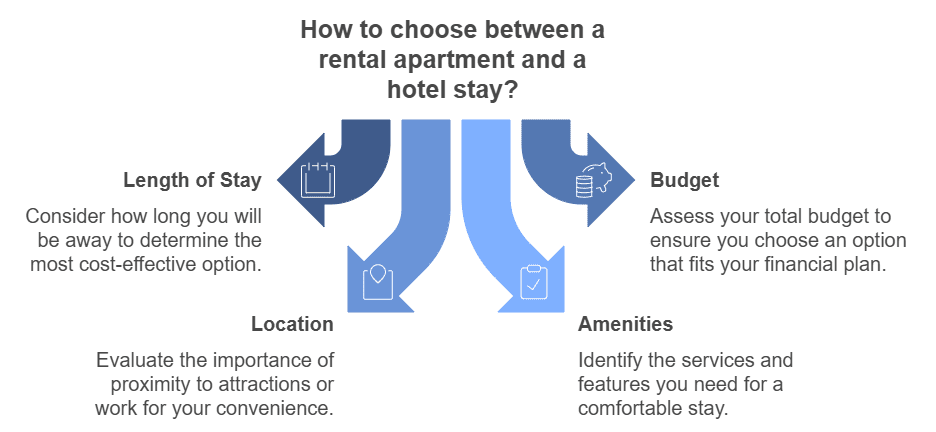Advantages and disadvantages of rentals during vacation

Apartment stays can offer you more space, flexibility, and amenities compared to traditional hotels. When considering your travel needs, you should weigh the cost-effectiveness of an apartment rental, especially for longer stays, against the convenience and services that hotels provide. Ideally, an apartment is a smart choice when you desire a homely atmosphere, need a kitchen, or plan a trip with family or friends. However, don’t overlook potential downsides like maintenance issues or location drawbacks, as they can impact your overall experience. This article discusses the advantages and disadvantages of rentals during vacation to help readers make informed accommodation choices.
Key Takeaways:
- Cost-effectiveness: Renting an apartment can often be more affordable than staying in a hotel, especially for extended visits.
- Space and amenities: Apartments typically offer more space and facilities, such as a kitchen, which can enhance comfort and convenience.
- Location flexibility: Renting allows for a choice of neighborhoods, providing opportunities to experience local culture more intimately than hotels.
- Privacy: Rentals can provide a more private and relaxed atmosphere, reducing the hustle and bustle associated with hotel living.
- Length of stay: Apartments are generally more suitable for longer stays, offering the comforts of home compared to the transient nature of hotels.
Understanding the Types of Accommodations
A comparison of different types of accommodations can help you determine what suits your needs best. Here’s a breakdown of the most common options:
| Type | Description |
| Hotels | Standardized service with amenities. |
| Motels | Budget-friendly and convenient location. |
| Hostels | Shared accommodations for social travelers. |
| Rental Apartments | A home-like atmosphere with more space. |
| Vacation Homes | Entire homes for family or group stays. |
Staying in a Hotel Vs. Renting an Apartment

Thou must consider your travel preferences and the purpose of your stay when choosing among these accommodations.
Hotels

While hotels offer a range of amenities, such as room service, daily housekeeping, and pools, they may lack the personal touch of home.
Prices can vary widely based on location, season, and star rating.
In general, hotels are best suited for short stays and those seeking convenience and service. Your choice will likely depend on your budget and the experience you desire.
Rental Apartments
Hotels tend to be seen as the traditional lodging choice, but rental apartments provide an excellent alternative.
With rental apartments, you have the advantage of a home-like environment, which is perfect for longer stays, as they typically offer kitchens and living spaces.

You can often find them at a lower cost per night compared to hotels, particularly for larger groups or families.
Understanding rental apartments can bring great benefits during your travels. They offer a sense of privacy and space, allowing you to cook your own meals and enjoy comfortable leisure time. However, make sure to consider the potential risks, such as lack of professional service or amenities you might be used to in hotels. Always read reviews to gauge the quality and safety of your choice. Each rental is unique; thus, finding the right one can significantly influence your travel experience.
Factors to Consider
Some aspects you should weigh while deciding between a rental apartment and a hotel include your duration of stay, budget constraints, and personal preferences. Each option offers distinct benefits and drawbacks that cater to different lifestyles and needs. Here are some factors to consider:
- Your travel purpose
- Location and accessibility
- Size and amenities offered
- Flexibility of booking
Assume that you prioritize these elements to align your accommodation choice with your personal and financial goals.
Duration of Stay
Clearly, the length of your visit significantly influences whether a rental or a hotel is more practical. If you are staying for a few days, hotels might provide convenience and short-term comfort.
However, if your trip extends to several weeks or months, rentals often become a more viable and economical option, allowing you to settle in more comfortably.
Budget Constraints
Even if you find hotels appealing, your budget constraints can make rentals a more attractive option.
Hotels often carry extra fees like service charges, parking, and taxes that can quickly add up, while apartments usually provide a flat rate for your entire stay, often inclusive of utilities.
Another factor to consider is that with budget constraints, you might find yourself facing unexpected expenses when choosing hotels.
Apart from the base rate, consider additional charges such as cleaning fees or deposits associated with a rental.
In contrast, many apartments allow you to cook your meals, which can drastically reduce costs on dining out.
This not only offers you the chance to save money but also gives you vital flexibility to manage your spending effectively, ensuring that your travel budget remains intact while maximizing your experience.
Pros and Cons of Hotels
All hotels come with both advantages and disadvantages that can impact your travel experience. Considering these factors can help you make an informed decision when choosing between a hotel and an apartment rental for your stay.
Pros and Cons of Hotels
| Pros | Cons |
|---|---|
| Convenience of location | Higher cost compared to rentals |
| Housekeeping services | Less space and privacy |
| On-site amenities | Limited kitchen facilities |
| Concierge services | Inflexible check-in/check-out times |
| Security and safety | Impersonal atmosphere |
Advantages
Assuming you’re prioritizing convenience and comfort, hotels provide a hassle-free experience. Many offer a range of services, from daily housekeeping to concierge assistance, ensuring that your needs are catered to during your stay.
Disadvantages
Any traveler must consider the downsides of hotel accommodations. Among these factors are the typically higher costs, limited space, and lack of kitchen facilities that can restrict your experience, especially on longer trips.
Understanding the disadvantages can greatly influence your decision. High costs can quickly add up with daily breakfast or room service.
Furthermore, the limited space can feel cramped if you’re traveling with family or need to work while away.
Additionally, if you desire a homier ambiance and more control over your meals, the absence of cooking facilities can make your stay less enjoyable overall.
Choosing wisely between hotels and alternative accommodations can truly enhance your travel experience.
Pros and Cons of Rentals
Now, understanding the pros and cons of rentals can help you make an informed decision. Let’s break them down in the table below:
| Pros | Cons |
|---|---|
| More space for your belongings | Potential for unexpected maintenance issues |
| Ability to cook and prepare meals | Less flexibility in booking and check-in/out times |
| Cost-effective for longer stays | May require upfront deposits and fees |
| Access to local neighborhoods | Privacy concerns with shared amenities |
| More diverse accommodation styles | Limited services compared to hotels |
Advantages
With rentals, you gain significant advantages that enhance your travel experience. Not only do they provide ample space and amenities like kitchens to cook your meals, but they also allow you to immerse yourself in the local culture and neighborhoods.
Plus, for longer stays, the cost-effectiveness makes them a smart choice financially.
Disadvantages
There’s a downside to consider when opting for rentals. You might face unexpected maintenance issues that can disrupt your stay, which can be quite stressful.
Additionally, rentals may require you to deal with upfront deposits and fees that add to the initial costs.
It’s crucial to weigh these drawbacks seriously. For instance, handling urgent maintenance can not only affect your plans but also lead to additional expenses.
Also, the lack of flexibility in booking may result in inconveniences if your travel arrangements change.
A lack of hotel-like services can leave you feeling unsupported during emergencies, especially if proper contact information is not readily available.
Being informed about these aspects ensures you make the best choice for your needs.

Tips for Choosing the Right Option
Keep your preferences and budget in mind when making your decision between a rental and a hotel. Consider the following:
- Length of stay
- Budget constraints
- Desired amenities
- Location preferences
- Family-friendly options
You will find it easier to select the most suitable accommodation type.
Assess Your Needs
With a clear understanding of your travel needs and expectations, you can narrow down your choices effectively.
Consider factors like the size of your group, the purpose of your stay, and any specific conveniences you may require.
Prioritize what matters most for your trip, whether it’s space, privacy, or cost-efficiency. This will help you determine the best option.
Research and Compare
On your journey to find the ideal accommodation, research and comparison are fundamental. Below is a table to guide you:
Rental vs. Hotel Comparison
| Aspect | Rental | Hotel |
|---|---|---|
| Cost | Potentially lower for longer stays | Higher, especially for short trips |
| Space | More spacious, suitable for families | Compact, typically with limited space |
| Amenities | Full kitchen, laundry facilities | Room service, daily housekeeping |
Assess the options carefully by understanding their pros and cons. For instance, while rentals provide you with home-like amenities and greater space, hotels often offer convenience and immediate access to services.
Think about your priorities to make an informed decision.
Step-by-Step Guide to Decision Making
Not every choice is straightforward when deciding between a rental apartment and a hotel stay. To find the best option for your situation, you can use the following decision-making process:
| Factor | Consideration |
|---|---|
| Length of Stay | How long do you plan to be away? |
| Budget | What is your total budget for accommodation? |
| Location | Is proximity to attractions or work important? |
| Amenities | What services and features do you need? |
Evaluate Your Criteria
The decision-making process begins with assessing your unique requirements. List important aspects such as your budget, length of stay, and desired amenities.
This evaluation helps clarify what will truly meet your needs, setting a solid foundation for your choice between a rental and a hotel.
Make an Informed Choice
There’s more to consider than just initial costs when making your final decision. Look into all the financial implications associated with each option to better understand how they align with your needs.
Informed decision-making allows you to weigh the positives and negatives of each accommodation option thoroughly.
A rental might provide you with a more spacious environment and flexibility for longer stays, while a hotel usually offers immediate access to services and amenities.
Recognizing these factors ensures you select an option that enhances your experience while staying within your desired budget. Ultimately, prioritizing your preferences will lead you to the smartest accommodation choice.

Final Words
Summing up, choosing between a rental apartment and a hotel depends on your specific needs and circumstances.
If you seek a homey environment, need more space, or want a longer stay, renting an apartment can offer significant benefits, including cost savings and flexibility.
On the other hand, if convenience and services are your priorities for short trips, hotels might be the better option.
Ultimately, assess your travel habits, budget, and comfort preferences to make the smartest choice for your situation.
What are the main advantages of choosing a rental apartment over a hotel stay?
Rental apartments often provide more space and amenities compared to hotel rooms. You typically benefit from a full kitchen, allowing you to cook meals and save on dining costs. Additionally, rentals usually offer a homier atmosphere, with separate living and sleeping areas, which can be especially appealing for families or groups. Moreover, staying in a rental can provide a more local experience, as many rentals are situated in residential areas, allowing you to immerse yourself in the community.
For how long should I consider renting an apartment instead of booking a hotel?
Renting an apartment tends to make more economic sense for stays of a week or longer. Hotels charge nightly rates, which can add up quickly for extended trips. In contrast, many rental properties offer weekly or monthly discounts that lower the overall cost. If you’re planning a vacation, business trip, or temporary relocation that exceeds a week, a rental apartment can provide substantial savings.
Are there any hidden costs associated with renting an apartment?
Yes, while rental apartments can be cost-effective, potential hidden costs may include cleaning fees, security deposits, and utilities that might not be included in the advertised rate. It’s crucial to read the rental agreement carefully to understand all costs upfront. Additionally, some services like Wi-Fi, parking, and access to amenities (like pools or gyms) may incur extra charges, so be sure to factor those into your budget.
How do the experiences of living in a rental apartment differ from staying in a hotel?
The experience of staying in a rental apartment can be significantly different from a hotel. In an apartment, you have control over your environment, including cooking your meals and managing your schedule. You might also enjoy a more personalized experience, with the apartment often reflecting the local culture and style. In contrast, hotels may offer more services like daily housekeeping, concierge services, and on-site dining, which can enhance convenience but limit the feeling of home.
Is it suitable for everyone to choose a rental apartment over a hotel?
Choosing a rental apartment is not ideal for everyone. Travelers who prefer the convenience of hotel services, such as daily housekeeping and room service, might find hotels more appealing. Additionally, individuals who are unfamiliar with the rental process may encounter challenges such as managing check-ins, cleaning, and dealing with issues that might arise during their stay. It can be beneficial to weigh your personal preferences, travel style, and needs before deciding between a rental and a hotel.


